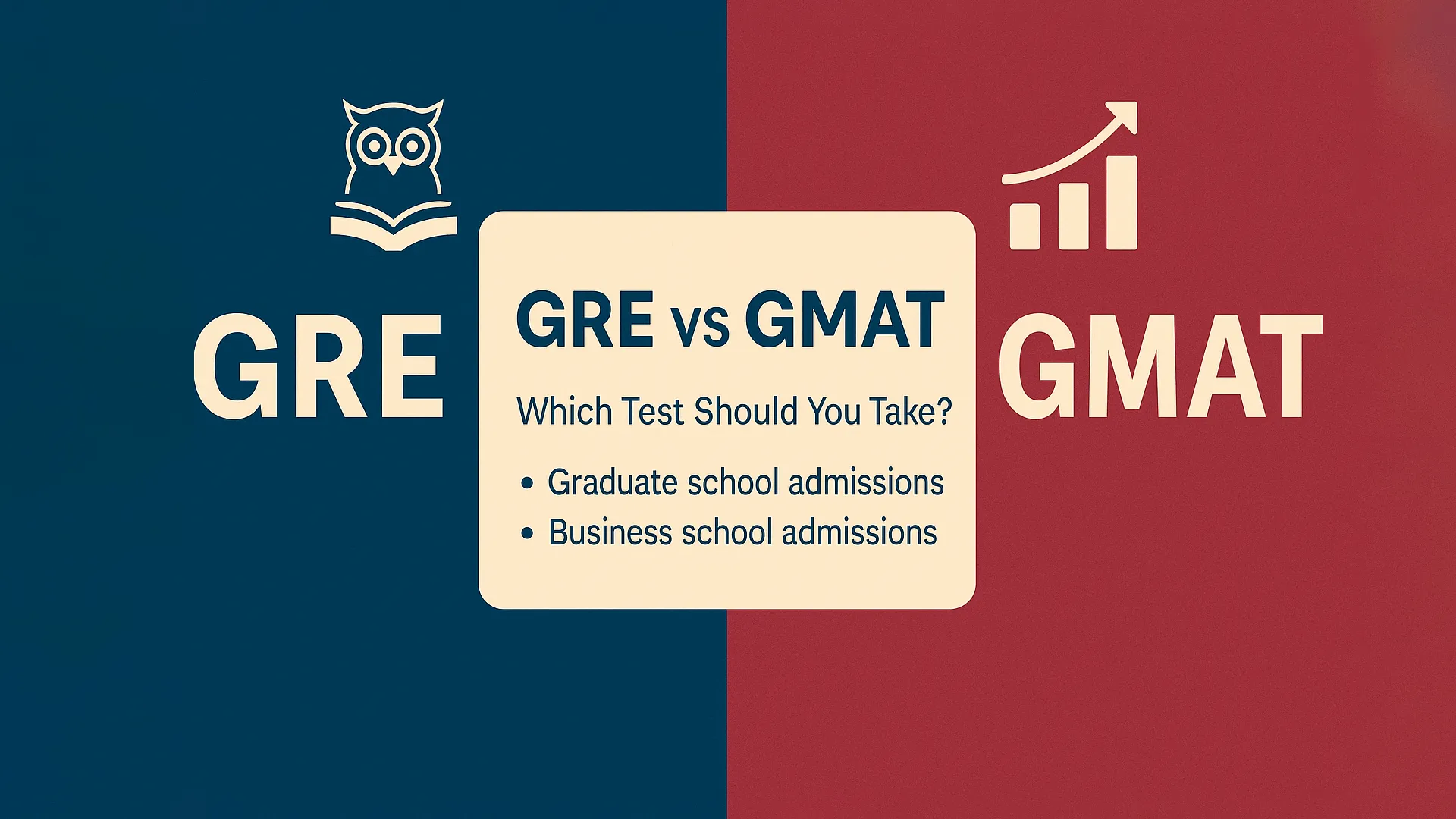Compare GRE and GMAT to decide which graduate admission test suits you best. Practical guidance, differences, and official links included.
If you're preparing for graduate school — especially business or management programs — you'll likely encounter two widely recognized exams: the GRE (Graduate Record Examination) and the GMAT (Graduate Management Admission Test). Both tests are accepted globally but differ in format, scoring, and emphasis. Choosing the test that aligns with your strengths and target programs can improve your admissions chances and make preparation more efficient.
What are GRE and GMAT?
- GRE — administered by ETS. Widely accepted by many graduate programs (master's, PhD) and by many business schools.
- GMAT — administered by GMAC. Traditionally the primary test for business school admissions (MBA and related programs).
Key Differences at a Glance
| Feature | GRE | GMAT |
|---|---|---|
| Accepted by | Many graduate programs (master's, PhD) and many business schools. | Primarily business schools; widely used for MBA admissions around the world. |
| Sections / Content | Verbal Reasoning, Quantitative Reasoning, Analytical Writing. | Quantitative Reasoning, Verbal Reasoning, Data Insights / Integrated Reasoning (format depends on current edition). |
| Question types | Reading comprehension, text completion, sentence equivalence, standard quantitative questions. | Problem solving, data-sufficiency in Quant, sentence correction, critical reasoning in Verbal. |
| Scoring | Verbal and Quant: 130–170 each. Analytical Writing: 0–6. | Section scales vary by edition; historically a combined total scale (e.g., 200–800) with individual section scores—check the latest GMAT format for current scales. |
| Adaptive format | Section-level adaptive: difficulty of a later section depends on performance in earlier sections. | Item-level adaptive in certain sections (each answered item can affect subsequent items) in some formats; pacing and adaptation differ from GRE. |
| Best for | Applicants who want flexibility across graduate programs and who are stronger in verbal and vocabulary. | Applicants targeting business school who excel in quantitative reasoning and logical problem solving. |
Pros & Cons — Which Feels Easier?
Each test emphasizes different skills. Here are the general tendencies to help you weigh pros and cons:
- Verbal / Vocabulary: GRE often tests vocabulary more directly (text completion, sentence equivalence). If you enjoy reading and building vocabulary, GRE may play to your strengths.
- Quantitative / Math: GMAT Quant includes data-sufficiency questions and can be more nuanced in logical set-ups. If you're strong at reasoning under time pressure, GMAT may suit you.
- Writing / Analytical: GRE has an explicit Analytical Writing section; GMAT's writing emphasis varies with format and newer editions.
2025 Trends
Recent exam updates and acceptance trends in 2025:
- Most graduate programs and many business schools now accept either GRE or GMAT — but always check your target schools' specific requirements.
- GMAT has introduced updates that emphasize data interpretation and integrated reasoning in newer formats.
- GRE continues to offer flexible testing options (including at-home testing where available).
How to Decide: Practical Questions to Ask Yourself
- 1 Which programs are you applying to? — Check each program's admissions page for test preferences or requirements.
- 2 What are your strengths? — If you're better at vocabulary & reading, GRE may be easier. If you're stronger at quantitative reasoning and logical puzzles, consider GMAT.
- 3 How much prep time do you have? — GMAT's adaptive logic and data questions may require focused practice on reasoning techniques; GRE may require steady vocabulary building.
- 4 Do you want future flexibility? — GRE is broadly accepted across many types of graduate programs; GMAT signals a focused business pathway.
- 5 Logistics & format preference — Check fees, test center availability or at-home testing options, and how comfortable you are with adaptive formats.
Official Exam Pages
For the most accurate and up-to-date information, consult the official exam pages:
- GRE — Official ETS site (About the GRE)
- GRE — Test content & syllabus (ETS India / content overview)
- GMAT — Official GMAT exam page (mba.com)
- GMAT — About the GMAT (GMAC)
Tip: Always verify section formats and score scales on the official pages before you register — testing formats and scales can update over time.
Summary & Recommendation
✓ Choose GRE if:
- You want flexibility across multiple graduate programs (not strictly business).
- Your strengths are verbal reasoning, vocabulary, and analytical writing.
- You prefer the option of at-home testing where available.
✓ Choose GMAT if:
- Your primary target is business school (MBA or related programs).
- You excel at quantitative reasoning, critical reasoning, and data analysis.
- You want to demonstrate specialized business-oriented analytical skills to admissions committees.
Final Decision Strategy
Ultimately, the best way to decide: take short diagnostic/mock tests for both GRE and GMAT formats, compare your strengths and scores, and confirm your target schools' preferences. That combination usually gives the clearest answer.
Key Takeaways
- Both GRE and GMAT are widely accepted, but check your target schools' preferences
- GRE offers more flexibility across different graduate programs
- GMAT is traditionally preferred for business school applications
- Take diagnostic tests for both to determine which aligns with your strengths
- Consider your career goals and the type of graduate programs you're targeting
